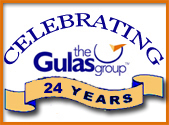 |
Are You Drowning in E-mail ?
© The Gulas Group 2010
Learn to Reduce Email Overload By 54%
E-mail is Making You Stupid! At least, that's what a headline in the March edition of Entrepreneur Magazine claims. But that's not all... a survey from the Radicall Group says we are in for a 42% increase in e-mail traffic between 2010 and 2012. If you think you get too much email now, the survey projects that we'll go from 294 billion pieces of e-mail traffic to 419 billion. We're all drowning in a tsunami of e-mail overload!
The article in Entrepreneur Magazine put this issue into a perspective that every organization in the world can understand. The cost to performance resulting from this tsunami of e-mail (which I call the "digital deluge" in terms of stress and hard dollars) is extraordinary. Here's an example of the cost of this phenomena from the article: "Computer chip giant Intel, for one, has estimated that e-mail overload can cost large companies as much as $1 billion a year in lost employee productivity. The intrusions are constant: each day a typical office employee checks e-mail 50 times and uses instant messaging 77 times, according to Rescue Time, a time management software development company."
We, using the system, can reduce e-mail overload by a whopping 54%. This figure is proven by post survey averages of 225 client companies worldwide and over 2,000 individuals who participated in our training for using tool boxes such as Microsoft Outlook and Lotus Notes. In the state of Alabama we were able to improve a global manufacture's e-mail overload problem by improving results over 66%!
We employ a systemic process to accomplish such outstanding successes for our clients. Some of the strategies we deploy to beat this e-mail "digital deluge" is first to work on changing behaviors. Most interventions like this fail because too much focus is on the tool and software . More focus must be placed on an individual's behavior, and most importantly, on the team or organization's behavior. We take a holistic approach and work to change the team or organization's behavior to create "organizational consistency."
"Organizational Consistency" simply means using the software tools proactively, not reactively. As a result, everyone is doing the right thing, for the right reason, at the right time. For instance, Organizational Consistency includes things like eliminating multitasking, scheduling an email appointment, and not opening your email program more than four times a day. When you do open your inbox to check your mail, spend no more than 20 minutes per session so you create a sense of urgency to Decide, Do, Delegate, or Delete.
|








 To get your free detailed analysis of your sales team follow this link or copy and paste www.gulasgroup.com/ratesalesforce.shtm
To get your free detailed analysis of your sales team follow this link or copy and paste www.gulasgroup.com/ratesalesforce.shtm